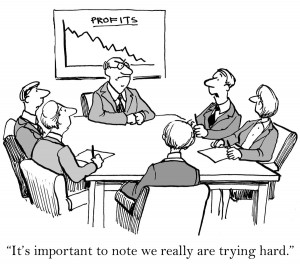Are You Overpaying Your Staff?

Sure, the aforementioned situations can lead to the underpayment of staff, but they can also lead to a more rarely reported problem: the overpayment of staff. Like underpayment, overpayment can lead to morale and performance issues if it goes unchecked.
While an inability to find benchmarks against which to evaluate your salaries can drive overpayment, overpayment also arises when there is a weak link — or not link at all — between performance and pay in your organization. For example, if there is a weak link between performance and pay in your organization, there is a very strong chance that you are overpaying average — or even poor — performers.
Overpayment resulting from faulty linkages between performance and pay may also mean that you do not have enough money available to correctly compensate your high performers. Unadressed, this situation could have very negative impacts on your business. For example, overpaid under-performers might have no incentive to improve their performances, and they’ll stagnate further. The result is that your low-performing employees will not be inclined to leave — because they’re being paid too well — and your high-performing employees will feel undervalued, which will motivate them to move on. If you are overpaying staff, you will lose high performers and accumulate mediocre performers.
If you are experiencing low turnover rates among mediocre performers and high turnover rates among top performers, there is a chance that your reward system is overcompensating mediocre performers at the expense of higher performers. To help you confirm this hypothesis, you might want to ask your staff members whether they believe there is a strong link between pay and performance in your business. A lot of negative responses would suggest that you have a problem of overpaying mediocre talent and underpaying your superstars.
If you do find you are overpaying mediocre employees and underpaying high performers, you can’t simply cut pay, as that would cause a lot of chaos. What you can do is adjust your annual pay raise process so that raises are awarded based on performance, rather than any other criteria, like longevity. Over time, this should restore the balance by transferring money away from mediocre performers and over to your top performers. You could also think about introducing a performance-related bonus scheme to help reduce the pay of mediocre employees while raising the pay of your best employees.
Making these sorts of changes should encourage your poor performers to either improve or leave, creating a healthier and more productive office environment.

